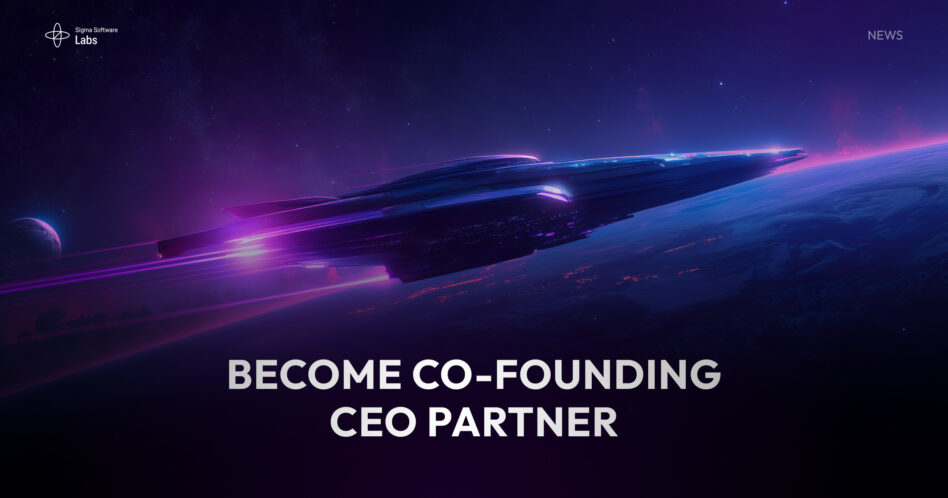Sigma Software Labs and SPEKA created the series of articles on the development of a startup at various stages of its existence. Leaders of Sigma Software Group share their experience so that every startup finds its place in the digital world.
The author: Valery Krasovsky, CEO and co-founder at Sigma Software, General Partner at Sigma Software Labs, General Partner at SID Venture Partners
A million-dollar idea… or not?
Many of those thinking about their own startup are afraid to tell anyone about it, reasoning this by the fact that a “million dollar” idea could be “borrowed” by others. In fact, I can reassure you, as most teams capable of implementing a startup idea have a lot to do already (because they have their own startups and their own business), they don’t have time to implement someone else’s borrowed idea. Big companies, on the other hand, would rather become your partners than steal an idea. After all, an idea by itself is worthless.
How could it be worthless, you would ask, when a bunch of angels and funds invest in startups that are just ideas? Yes, they do. But they don’t invest in ideas. Once you’ve come up with a product or service, there’s a lot more you need to do to make that idea a success. That’s why investments are made not in the ideas, but in the people behind those ideas.
Here’s a live example. Ten years ago, I installed an alarm at my home. It had very sensitive motion sensors, but an inconvenient interface and no ability to control it with a smartphone. At the time I thought: why don’t I create such a product? I remember that I gathered like-minded people, we started creating a prototype, but the work was slow. At the same time, similar products started to spring up like mushrooms. But only one team became truly successful, the one now called the Ajax company. What did they do that everyone else didn’t? They approached work systematically: assembled a team, worked quickly, organized production, and made a cool product that people needed.
There are similar ideas aplenty, but few have what it takes to implement them.
Keep it secret… keep it safe (c)
This is how Gandalf advised Frodo the hobbit. But this advice is useful only with regard to the One Ring 🙂 When talking about a startup, too much secrecy and desire to keep your idea safe can do more harm than good. So, it’s clear that stealing ideas isn’t profitable, because an idea on its own isn’t worth much. Thus, when you have an idea for a startup, talk about it as much as possible if you really want it to be successful.
Firstly, if you don’t have a team, it helps you find people who are motivated by your idea and who are willing to drive it towards success. Forming a team of like-minded people and partners that complement each other well, “covering” all the hard and soft skills necessary to found a startup is a great success.
Secondly, it’ll help you validate your idea at the initial stage, get feedback from potential users, understand whether it has any potential at all. So-called customer development, that is, the creation of a product oriented towards the needs of people, could be called a “silver bullet” for a startup 🙂 It’s clear that you, the author of the idea, like it “as is”. But a startup founder must be flexible, and there must be demand for the product on the market. If you see that customers are not buying your future product, you need to pivot and change the idea.
Thirdly, by talking about the idea, you increase your chances of getting investment right now rather than sometime in the future. By the way, this is another opportunity to see how your product will do on the market. If you failed to sell your idea to an investor, then, most likely, you won’t be selling it to customers either.
Why would the market want a second YouTube?
When launching your startup, you should always remember that there are a lot of smart people in the world, and it’s no wonder that many different people can come with the same idea. I’ve been working with startups for many years, launched several products with my partners, some of them have become successful. But still, when I find out that someone on the market is also making a similar product, the first thought that comes to my mind is “Oh bother, we’re late!”
However, unlike many young startup founders, my partners and I understand that competition is actually a good thing. If someone thought of the same thing as you, it’s proof that you’re making a product that the market needs.
In my opinion, there are some common mistakes startups make when they notice competition appearing on the market. The first is to give up and abandon the idea, thinking that the market doesn’t need two similar products. Back when YouTube entered the market, there were numerous similar solutions, but they all “died off” in the end. It wasn’t because the ideas were different. The difference was in their implementation. All those competitors turned out to be less clear and convenient, less flexible, and so lost the competition to YouTube.
The second is to overestimate yourself and ignore the competitors. Of course, self-confidence is a good thing, but studying your competitors is vital. This will help you identify your own “killer feature” that will set you apart from others and make you that much more successful. Yes, yes, I know that there are many stories of “copycat” products staying on the market for years and having their own followings. But can this really be called success, and is that what you want to achieve with your startup? I doubt that 😊
A good example of a startup that found its “killer feature” is Peloton. Do you know what’s interesting? This company sells exercise bikes. Just like thousands of other companies. But, unlike others, they are crazy popular and have a successful business. So, what’s their secret? While riding an exercise bike from Peloton, you can compete with your friend, partner or relative, wherever they are. “And that’s it?”, you’d ask. “That’s it”, I’d answer. It’s a really simple idea, which people really needed, and it turned Peloton into a $50 billion company.
Or here’s another cool example – Monobank. When they entered the market, Privat Bank already offered its online banking, and it was a company that had a huge IT department, which employed several thousand developers. Nevertheless, Monobank entered the market and outcompeted the giants. Why? Because of three main “killer features”: ultra-fast card registration, the absence of physical branches or the need to visit them to solve any issues, as well as a very simple and convenient interface.
Which idea will be successful?
In order for a startup idea to ultimately become successful, it doesn’t need to involve future technologies or reinvent the wheel. The main thing for a successful idea is the so-called product-market fit, that is, people have to need your product.
What could be simpler? But no, in fact, it’s very difficult, and most startups lose any chance of success at the idea stage, because their idea isn’t interesting to the market. One of the world’s most famous accelerators, Y Combinator, when starting work with startups, gives almost everyone the same feedback: “Your product lacks product-market fit”. According to them, it’s present when, without any marketing, the product’s user base grows by 500% a month. How many such solutions can you name? Here’s your answer.
Is an innovative approach a key to startup’s success? Yes, but if you think of innovation as something like the SpaceX program, it’s not. Even a fairly simple product can be innovative if it helps to make processes everyone knows more convenient. Innovative thinking is the ability to look at the world from a different angle and find niches where people’s lives can be improved.
Successful ideas… A natural talent or acquired skill?
There are people who “give birth” to many cool, creative and breakthrough ideas. Many people believe that this requires talent and is impossible to learn. In fact, some aptitude will certainly come in handy, but a specific type of thinking will be far more important. Most people simply accept the daily rules they’re used to living by. Most likely, they don’t think about the fact that some processes and approaches can be made more convenient, effective, and optimal. Start asking yourself how and what can be done better at every step, and ideas for innovative startups will appear in your mind.
From my experience, I can say that successful ideas for startups often lie at the intersection of two different industries. And this is why it’s important to develop expertise in different domains and immerse yourself in the real problems experienced by people and businesses as much as possible. Then you’ll get ideas that have potential.
APPLY STARTUP
TO MAKE THE UNICORN HAPPEN

